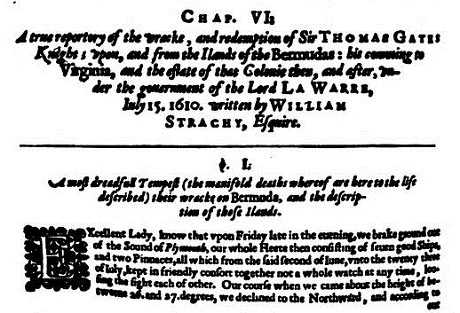| directory |
| home | contact |
|
|||||||||||||||
| search | |||||||||||||||
Shakespeare's Tempest and BermudaStorm and ShipwreckFrom The Tempest. Ed. Henry Norman Hudson. Ginn and Company. America may justly claim to have had a large share in suggesting and shaping the delectable workmanship of The Tempest. In May, 1609, a fleet of nine vessels under the command of Sir George Somers sailed from England with provisions and five hundred settlers for the newly founded colony of Virginia. On July 25 a storm separated the "Sea Adventure" (some narratives give the name as "Sea Venture") from the other vessels of the fleet, and, with Somers and Sir Thomas Gates on board, it was wrecked three days later on the coast of the Bermudas. The crew reached one of the islands in safety, and in May, 1610, continued their voyage to Virginia in two boats of cedar which they had built on the island. Meanwhile news of the disaster had reached England, and intense was the excitement there when in 1610 some of those who had taken part in these thrilling experiences returned home. That year saw the appearance of at least four narratives of the wreck, and to all Shakespeare may have had access. It is not unlikely that he would learn some details from the lips of the returned sailors and adventurers themselves. In this connection the fact is noteworthy that Shakespeare's friends and patrons, the earls of Southampton and Pembroke, were among the noblemen interested in the Somers expedition for business reasons. 1. Strachey's True Reportory. The earliest written narrative of the shipwreck of the "Sea Adventure" is in a Reportory, dated July 15, 1610, addressed by William Strachey (Strachy) from Jamestown to some "excellent lady" in England. The full tide of this Repertory as printed, probably for the first time, in Purchas, Part IV, lib. ix, ch. vi, is here given in facsimile:  In the Reportory and The Tempest are several striking verbal coincidences, both in the account, of the storm and, in the description of the birds and berries of the island; and the probability is strong that Shakespeare had access to Strachey's original manuscript, which seems to have been brought to England by Sir Thomas Gates immediately after it was written. Strachey was a man of genuine poetic power; and it is interesting to note that in 1612 he had a lodging in the Blackfriars, where Shakespeare purchased a house in 1613. 2. Jourdan's Discovery, Silvester Jourdan (Jourdain) came to England with Gates in 1610, and in October published his narrative- of the famous wreck under the following title: A Discovery of the Barmudas, otherwise called the Ile of Divels: By Sir Thomas Gates, Sir George Sommers, and Captayne Newport, with diuers others. Set forth for the loue of my Country, and also for the good of the Plantation of Virginia. Sil. Jourdan, London, 1610, Jourdan's pamphlet describes the region as "never inhabited" but "ever esteemed and reputed a most prodigious and enchanted place." "Yet did we find there the ayre so temperate and the country so aboundantiy fruitfull for the sustentation and preseruation of man's life . . . that we were refreshed and comforted." 3. A True Declaration. Towards the close of 1610 appeared a third narrative of the shipwreck of the "Sea Adventure," and a description of the regions involved. The title reads: A True Declaration of the Estate of the Colonie in Virginia, With a Confutation of such scandalous Reports as have tended to the disgrace of so worthy an enterprise. In this anonymous pamphlet, purporting to be published "by Advise and direction of the Councell of Virginia," the wreck is said to have been caused by a thunderstorm; the after events are called a "Tragicall-Comaedie"; and the Bermudas are described as "an inchanted pile of rockes, and a desert inhabitation for divels"; but, adds the writer, "all the fairies of the rocks were but flockes of birds, and all the divels that haunted the woods were but heardes of swine." 4. Riches Newes from Virginia. Along with these prose narratives of the year 1610 must be mentioned a set of "butter-women's rank to market" verses, a ballad with the following title: Newes from Virginia, The Lost Flocke triumphant, with the happy Arriual of that famous and worthy knight, Sr Thomas Gates, and the well reputed and valiant Captaine Mr, Christopher Newporte, and others, into England, With the manner of their distresse in the Hand of Deuils (otherwise called Bermoothawes), where they remayned 42 weekesy and builded two Pynaces in which they returned into Virginia. By R, Rich, Gent,, one of the Voyage, London, 1610. The third stanza repeats the interesting spelling "Bermoothawes" (cf. note, I, ii, 229): The seas did rage, the windes did blowe, distressed were they then; Their ship did leake, her tacklings breake, in daunger were her men. But heaven was pylotte in this storme, and to an iland nere, Bemioothawes call'd, conducted then, which did abate their feare. From such contemporary narratives as these Shakespeare derived color and atmosphere for his enchanted island. That he did not intend the Bermudas as the scene of the action is evident from Ariel's words in I, ii, 228-229. ___ How to cite this article: ___ Related Articles |
©1999-2021 Shakespeare Online. All Rights Reserved.